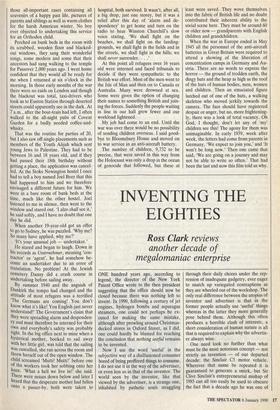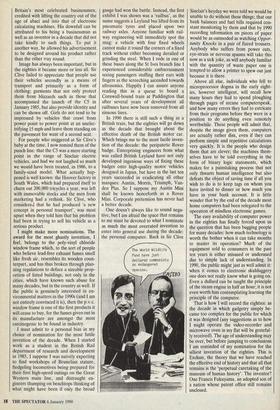INVENTING THE EIGHTIES
Ross Clark reviews
another decade of megalomaniac enterprise
ONE hundred years ago, according to legend, the director of the New York Patent Office wrote to the then president suggesting that the office should now be closed because there was nothing left to invent. In 1990, following a century of jet engines, hydrogen bombs and asparagus steamers, one could not perhaps be ex- cused for making the same mistake, although after prowling around Christmas- decked stores in Oxford Street, as I did, one could hardly be blamed for reaching the conclusion that nothing useful remains to be invented.
Now I use the word 'useful' in the subjective way of a disillusioned consumer bored of being proffered things to consume. I do not use it in the way of the advertiser, or even less so in that of the inventor. The world seen by the inventor, like that viewed by the advertiser, is a strange one, inhabited by pathetic souls struggling through their daily chores under the rep- ression of inadequate gadgetry, ever eager to snatch up variegated contraptions as they are wheeled out of the workshop. The only real difference between the utopias of inventor and advertiser is that in the former people actually use 'useful' things whereas in the latter they more generally pose behind them. Although this often produces a horrible clash of interests, a short consideration of human nature is all that is required to explain why the advertis- er always wins. One need look no further than what must be the most notorious concept — not strictly an invention — of our departed decade: the Sinclair C5 motor vehicle. Wherever that name be repeated it is guaranteed to generate a smirk, but Sir Clive Sinclair's entrepreneurial mishap of 1985 can all too easily be used to obscure the fact that a decade ago he was one of Britain's most celebrated businessmen, credited with lifting the country out of the age of abaci and into that of electronic calculating machines. His downfall can be attributed to his being a businessman as well as an inventor in a decade that did not take kindly to such things. To put it another way, he allowed his advertisement to be designed around his product rather than the other way round.
Image has always been important, but in the eighties it became more or less all. Sir Clive failed to appreciate that people use their vehicles secondly as a means of transport and primarily as a form of clothing; garments that not only protect them from blizzards such as those that accompanied the launch of the C5 in January 1985, but also provide identity and can be shown off. Girls do not tend to be impressed by vehicles that crawl from power point to power point at an unelec- trifying 15 mph and leave them standing on the pavement for want of a second seat.
For people who sniggered at Sir Clive's baby at the time, I now remind them of the punch line: that the C5 was a mere starting point in the range of Sinclair electric vehicles, and had we not laughed so much we would have been treated, in 1986, to a family-sized model. What actually hap- pened is well known: the Hoover factory in South Wales, which had prepared itself to churn out 200,000 tricycles a year, was left with immovable stocks and the men from marketing had a rethink. Sir Clive, who considered that he had produced 'a new concept in personal transport', was most upset when they told him that his problem had been in trying to sell his vehicle as a serious product.
I might make more nominations. The award for the most ghastly invention, I feel, belongs to the poly-vinyl chloride window frame which, to the sort of people who believe lead-free exhaust fumes smell like fresh air, resembles its wooden coun- terpart, and has thus broken through plan- ning regulations to deface a sizeable prop- ortion of listed buildings, not only in the cities, which have known such abuse for many decades, but in the country as well. If the public is genuinely interested in en- vironmental matters in the 1990s (and I am not entirely convinced it is), then the p.v.c. window frame is one of the first products it will cease to buy, for the fumes given out in its manufacture are amongst the most carcinogenic to be found in industry.
I must admit to a personal bias in my choice of nomination for the most futile
invention of the decade. When I started
work as a student in the British Rail department of research and development
in 1985, I suppose I was naively expecting
to find workshops of Brunelian stature, fledgeling locomotives being prepared for their first high-speed outings on the Great Western main line, and distraught en- gineers thumping on benchtops thinking of what might have been if only the broad gauge had won the battle. Instead, the first exhibit I was shown was a `railbus', as the name suggests a Leyland bus lifted from its pneumatic tyres and placed upon two railway axles. Anyone familiar with rail- way engineering will immeditely spot the snag: a vehicle with four fixed wheels cannot make it round the corners of a fixed track without either becoming derailed or grinding the steel. When I rode in one of these buses along the St Ives branch line I experienced considerable embarrassment seeing passengers stuffing their ears with fingers as the screeching ascended towards ultrasonics. Happily I can assure anyone reading this in a queue to board a Cornwall-bound train at Paddington that after several years of development all railbuses have now been removed from all sinuous lines.
In 1990 there is still such a thing as a British train, but the eighties will go down as the decade that brought about the effective death of the British motor car. Which brings me to the most facile inven- tion of the decade: the peripatetic Rover badge. Enterprising engineers from what was called British Leyland have not only developed ingenious ways of fixing these badges onto high-quality motor vehicles designed in Japan, but have in the last ten years succeeded in eradicating all other marques: Austin, Morris, Triumph, Van- den Plas. So I suppose my Austin Mini shall be known henceforth as a Rover Mini. Corporate pretension has never had a better decade.
One doesn't always like to sound nega- tive, but I am afraid the space that remains to me must be devoted to what I nominate as much the most overrated invention to enter into general use during the decade: the personal computer. Back in Sir Clive
Sinclair's heyday we were told we would be unable to do without these things; that our bank balances and fuel bills required con- stant monitoring by them and that by 1990 recording information on pieces of paper would be as outmoded as watching Oppor- tunity Knocks in a pair of flared trousers. Anybody who suffers from power cuts, eye-strain or nervous spasms will take this now as a sick joke, as will anybody familiar with the quantity of waste paper one is tempted to allow a printer to spew out just because it is there.
Above all else, individuals who fell to microprocessor dogma in the early eight- ies, however intelligent, will recall how many hours they had to spend ploughing through pages of arcane computerspeak, and how many errors they had to extricate from their programs before they were in a position to do anything even remotely worthwhile. These people will admit that, despite the image given them, computers are actually rather dim, even if they can perform simple and repetitive calculations very quickly. It is the people who design them that are clever; the machines them- selves have to be told everything in the form of binary logic statements, which makes for a painstaking process that not only thwarts human intelligence but also defeats the object of saving time if all you wish to do is to keep tags on whom you have invited to dinner or how much you have in your bank account. It is little wonder that by the end of the decade most home computers had been relegated to the operation of mindless electronic games.
The easy availability of computer power in the eighties has finally forced upon us the question that has been bugging people for many decades: how much technology is worth the bother when it can take months to master its operation? Much of the equipment sold to consumers in the past ten years is either misused or underused due to simple lack of understanding. In 1990, the public might just as well admit it: when it comes to electronic skulduggery one does not really know what is going on. Even a dullard can be taught the principle of the steam engine in half an hour; it is not even worth him contemplating learning the principle of the computer.
That is how I will record the eighties: as the decade in which gadgetry simply be- came too complex for the public for which it was designed (any suggestions as to how I might operate the video-recorder and microwave oven in my flat will be grateful- ly received). The age of understanding may be over, but before jumping to conclusions I am reminded of my nomination for the silliest invention of the eighties. This is Endism, the theory that we have reached the effective end of history and that all that remains is the 'perpetual caretaking of the museum of human history'. The inventor? One Francis Fukuyama, an adopted son of a nation whose patent office still remains unclosed.











































 Previous page
Previous page